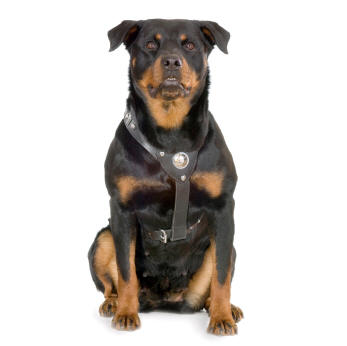The Andalusian Authorities have finally clamped down on dangerous dogs in the area. Whilst the law for exotic and potentially dangerous animals was initially introduced in 1999, the regulation has recently been updated and tightened up. As of February, owners have been given a 6 month moratorium to ensure that their exotic pets are handed over and dangerous dogs are registered. So for those of you who have a crocodile hiding in your back garden, its time to hand over your well-loved pet, or else…
Which breeds are affected?
The breeds affected include any pure and cross breeds of the following:
- Pitt Bull Terrier.
- Staffordshire Bull Terrier.
- American Staffordshire Terrier.
- Rottweiler.
- Dogo Argentino.
- Fila Brasileiro.
- Tosa Inu.
- Akita Inu.
- Doberman.
 Apart from these specific breeds, the law also deems dogs dangerous if they exceed certain height and weight restrictions and if considered aggressive by a vet. See link for photos :
Apart from these specific breeds, the law also deems dogs dangerous if they exceed certain height and weight restrictions and if considered aggressive by a vet. See link for photos :
Dangerous dogs
What does the law state?
The law states that owners of these potentially dangerous dogs must not only obtain their licence from their local town hall but also register their ‘dangerous dogs’ locally on the Junta de Andalucia’s Register of potentially Dangerous Animals. Furthermore their dogs need to be covered by a civil responsibility insurance cover for a minimum of 175,000 euros to cover owners in case of damage caused by their dogs for any personal or material damage. Dogs must go through a specific training course and can under no circumstances be trained to be aggressive. Dogs must also be vaccinated for Rabies and sterilized to avoid future aggressive behaviour.
The legislation also states that owners must be over 18 with no previous criminal record. Owners will also need to undergo psychological tests and prove that they are physically capable. Potentially dangerous dogs must attend a training course and owners must show proof of attendance when registering the animal. They will be given an animal identity card and registration document and will be required to carry these around with them at all times.
Dogs labelled as ‘potentially dangerous’ can only frequent public areas if fitted with a muzzle and walked on a special lead (which must not be greater than one metre in length). No adult can walk more than one ‘potentially dangerous dog’ at a time. Dogs will also not be allowed to enter areas designed for minors such as children’s parks, leisure areas and school playgrounds. If one of these pets goes missing, the owner is required by state to report this within 24 hours.
The law also includes detail on the types of installations required for properties housing these dogs. Properties must have clear signs, high walls or fences and strong doors to ensure that dogs cannot get out. If properties do not have these restrictions, the dogs need to be chained up.
What are the penalties if I do not adhere to the law in question?
Owners not adhering to the law will be fined up to 115,000 euros. Authorities will also have the ability to order dogs to be ‘put down’ if seen to be dangerously aggressive.
Who will insure me?
Many pet insurances will not cover potentially dangerous dogs. However Zurich Home Insurance enables owners of dangerous dogs to add their pet onto their standard buildings and contents insurance. There is a specific option for dangerous dogs. The benefit of this type of insurance is that you pay a small premium to include your dog whereas purchasing a separate public liability cover could be quite costly as a stand alone policy.
For further information on Zurich’s household insurance and dangerous dog cover, please contact us at Hamilton Insurance on Debbie@hamilton-insure.com or call us on +34 952897347 (between 10:00-14:00, 16:00 – 19:00 Monday to Friday)
I have a potentially dangerous dog, how do I register it?
All dogs need to be registered before 3 months of age. On a visit to the vet, a dog will need to be micro-chipped and the vet can complete the registration documents. Over and above this, owners of potentially dangerous dogs need to register dogs at the Town Hall. Licences are valid for five years.
Documentation required may include:
Documentation required may differ between municipalities but the list below gives an idea as to the type of documentation required. It is best to call your local town hall for specific requirements:
- Photocopy of owner’s identification documentation
- 2 passport photos (of owner)
- Original Certificate showing that the owner has no previous criminal records
- Certificate showing psychological aptitude (similar to that required for people purchasing firearms)
- Certificate showing physical capability
- Insurance policy showing that they are covered for civil responsibility and receipt to prove last receipt
- Dog Registration documents
- Proof of vaccines
- Proof of attendance to specialist training course for dangerous dogs
Where can I get further information?
Sources and useful links:
Sur in English
http://www.algorfa.co.uk/PreviousNewsletters/Algorfa-news19.html
http://www.typicallyspanish.com/news/publish/article_15120.shtml
http://www.nerjatoday.com/nerjanews/archives/179
http://www.fuengirola.org/portalFuengirola/RecursosWeb/DOCUMENTOS/1/0_1421_1.pdf
http://noticias.juridicas.com/base_datos/Admin/rd287-2002.html http://costadelsol.angloinfo.com/countries/spain/animals.asp
http://www.20minutos.es/noticia/251165/0/mascotas/peligrosas/prohibir/